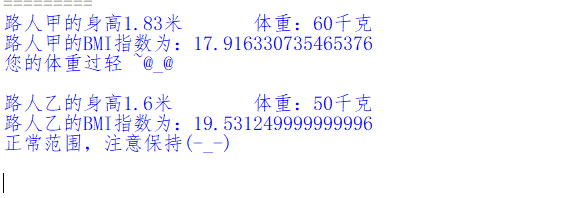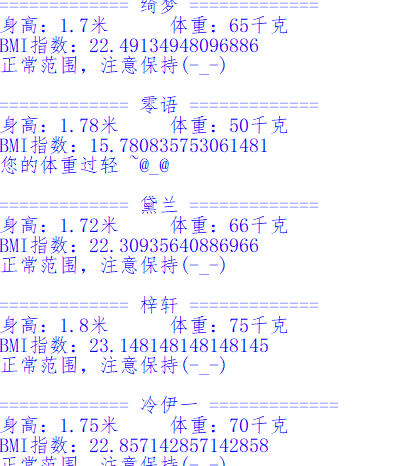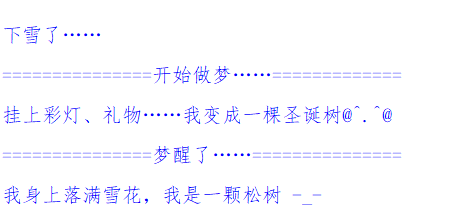第六章
def function_tips():
'''功能:每天输出一条励志文字
'''
import datetime
mot = ["今天星期一:\n坚持因为我别无选择",
"今天星期二:\n含泪播种的人一定能笑着收获",
"今天星期三:\n做对的事比把事情做对更重要",
"今天星期四:\n不要等到明天,明天太遥远,今天就行动",
"今天星期五:\n命运给予我们的不是失望之酒,而是机会之杯",
"今天星期六:\n求知若饥,虚心若愚",
"今天星期日:\n成功将属于那些从不说不可能的人"]
day = datetime.datetime.now().weekday()
print(mot[day])
function_tips()
实例2

def fun_bmi(person, height, weight):
'''
功能:根据身高和体重计算BMI指数
person:姓名
height:身高,单位:米
weight:体重,单位:千克
'''
print(person + "的身高" + str(height) + "米 \t 体重:" + str(weight) + "千克")
bmi = weight / (height * height)
print(person + "的BMI指数为:" + str(bmi))
if bmi < 18.5:
print("您的体重过轻 ~@_@\n")
if bmi >= 18.5 and bmi < 24.9:
print("正常范围,注意保持(-_-)\n")
if bmi >= 24.9 and bmi < 29.9:
print("肥胖 ^@_@^\n")
fun_bmi("路人甲", 1.83, 60)
fun_bmi("路人乙", 1.60, 50)

实例3
def fun_bmi_upgrade(*person):
'''
功能:根据身高和体重计算BMI指数(共享升级版)
*person:可变参数该参数中需要传递带3个元素的列表,
分别为姓名、身高(单位:米)和体重(单位:千克)
'''
for list_person in person:
for item in list_person:
person = item[0]
height = item[1]
weight = item[2]
print("\n" + "="*13, person, "="*13)
print("身高:" + str(height) + "米 \t 体重:" + str(weight) + "千克")
bmi = weight / (height * height)
print("BMI指数:" + str(bmi))
#判断身材是否合理
if bmi < 18.5:
print("您的体重过轻 ~@_@")
if bmi >= 18.5 and bmi < 24.9:
print("正常范围,注意保持(-_-)")
if bmi >= 24.9 and bmi < 29.9:
print("肥胖 ^@_@^")
list_w =[('绮梦', 1.70, 65),('零语', 1.78, 50),('黛兰', 1.72, 66)]
list_m =[('梓轩', 1.80, 75),('冷伊一', 1.75, 70)]
fun_bmi_upgrade(list_w, list_m)

实例4
def fun_checkout(money):
'''
功能:计算商品合计金额并进行折扣处理
money:保存商品金额的列表
返回商品的合计金额和折扣后的金额
'''
money_old = sum(money)
money_new = money_old
if 500 <= money_old < 1000:
money_new = '{:.2f}'.format(money_old * 0.9)
elif 1000 <= money_old < 2000:
money_new = '{:.2f}'.format(money_old * 0.8)
elif 2000 <= money_old < 3000:
money_new = '{:.2f}'.format(money_old * 0.7)
elif money_old >= 3000:
money_new = '{:.2f}'.format(money_old * 0.6)
return money_old, money_new
print("\n开始结算......\n")
list_money = []
while True:
inmoney = float(input("输入商品金额(输入0表示输入完毕):"))
if int(inmoney) == 0:
break
else:
list_money.append(inmoney)
money = fun_checkout(list_money)
print("合计金额:", money[0], "应付金额:", money[1])

实例5
pinetree = '我是一颗松树'
def fun_christmastree():
'''
功能:一个梦
无返回值
'''
pinetree = '挂上彩灯、礼物……我变成一棵圣诞树@^.^@ \n'#定义局部变量
print(pinetree)
print('\n下雪了……\n')
print( '===============开始做梦……=============\n')
fun_christmastree()
print ( '===============梦醒了……===============\n')
pinetree ='我身上落满雪花,' + pinetree + ' -_- '
print(pinetree)

实例6
bookinfo =[('不一样的卡梅拉(全套)', 22.50, 120),('零基础学Android', 65.10, 89.80),
('摆渡人', 23.40, 36.00),('福尔摩斯探案全集8册', 22.50, 128)]
print('爬取到的商品信息:\n', bookinfo)
bookinfo.sort(key = lambda x:(x[1], x[1] / x[2]))
print('排序后的商品信息:\n', bookinfo)

实战1
def Actor(actor):
print(actor + "开始参演这个剧本")
person = input("导演选定的主角是:")
Actor(person)

实战2


 浙公网安备 33010602011771号
浙公网安备 33010602011771号